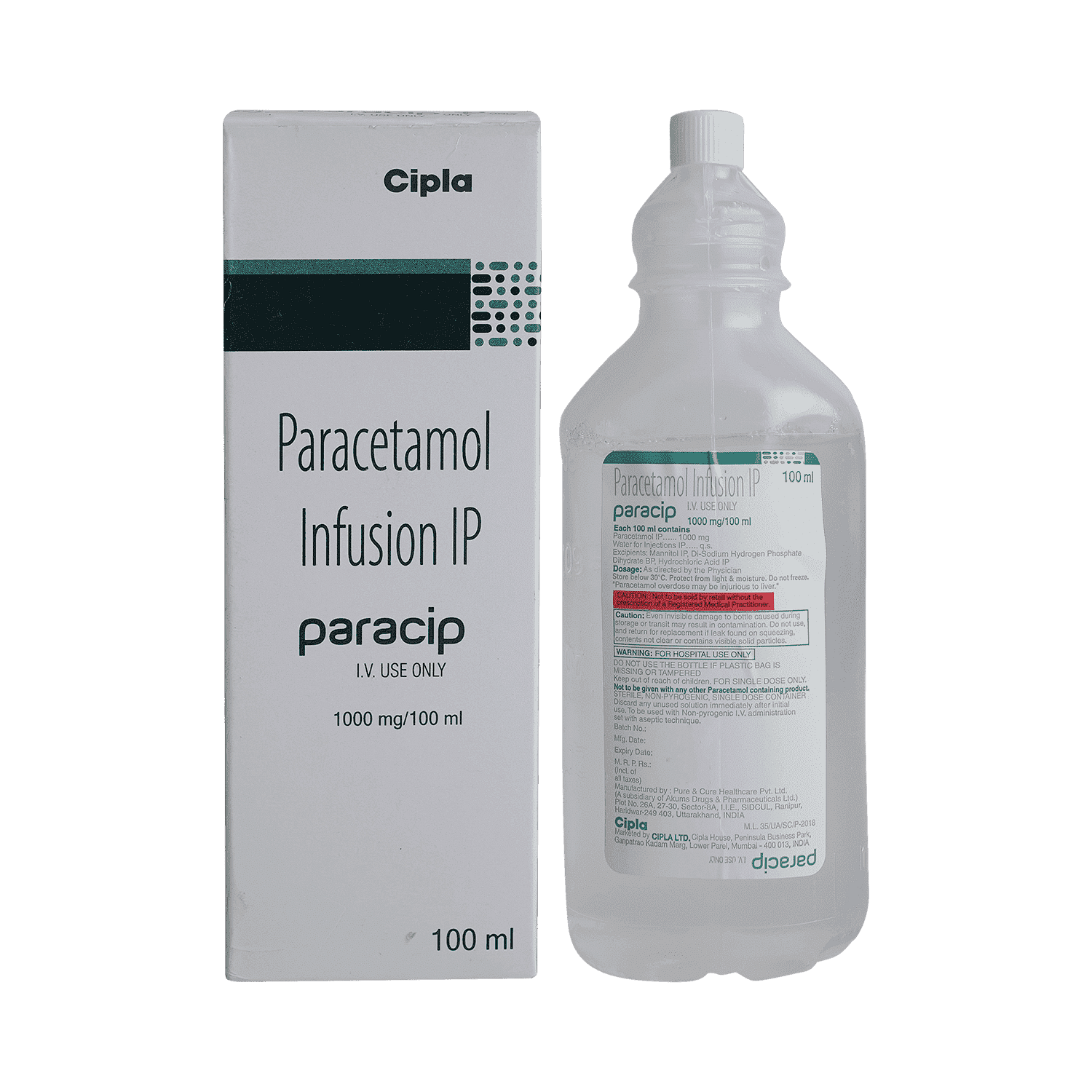
Gypgesic 1000mg Infusion
Manufacturer
Biotric Healthcare Pvt Ltd
Salt Composition
Paracetamol (1000mg)
Key Information
Short Description
Gypgesic 1000mg Infusion helps in relieving moderate pain and reducing fever for the short-term in cases following surgery or in cases where oral administration is not possible.
Dosage Form
Infusion
Introduction
Gypgesic 1000mg Infusion is administered by a doctor or a nurse and should not be self-administered. Depending on the severity of your underlying illness, your doctor will decide the precise dose and schedule as per which this injection is to be given. It starts working within one hour. Inform your doctor if you are also taking other medications containing paracetamol to avoid an overdose. You should let your doctor know if your pain or fever does not subside. Vomiting, difficulty sleeping, and constipation may be seen as side effects in some patients. Consult your doctor if these side effects do not resolve with time and persist for a longer duration of time. Inform your doctor immediately if any rash or allergic reaction is observed while taking this medicine. Pregnant and nursing women should use it under medical supervision only. It should be used with caution in patients with liver and kidney disease or alcohol abuse. It is not recommended in patients with severe or active liver disease.
Directions for Use
Your doctor or nurse will give you this medicine. Kindly do not self-administer.
How it works
Gypgesic 1000mg Infusion is an analgesic (pain reliever) and anti-pyretic (fever reducer). It works by blocking the release of certain chemical messengers that cause pain and fever.
Quick Tips
Gypgesic 1000mg Infusion helps in relieving moderate pain and fever for the short-term, especially following surgery. Inform your doctor if you are also taking other medications containing paracetamol. Inform your doctor if you suffer from liver disease, severe kidney disease, or alcohol abuse. Inform your doctor if you experience symptoms such as feeling or being sick, weight loss, pale skin (pallor), or abdominal pain within the first 24 hours as it indicates an overdose. Your doctor may regularly monitor your kidney function, liver function, and levels of blood components if you are taking this medicine for long-term treatment.
Related Medicines

Dolo Infusion

Paracip Infusion

Paramay IV 1000mg Infusion

Thermochill-P Infusion

Paraprl 1000mg Infusion

Tabimol 1000mg Infusion

Thermadol 1000mg Infusion

Afymol Infusion

Puramol 1000mg Infusion

Profuse 1000mg Infusion
Frequently asked questions
How is Gypgesic 1000mg Infusion administered?
Gypgesic 1000mg Infusion should only be administered under the supervision of a trained healthcare professional or doctor. Do not self-administer. The dose will depend on your specific condition and will be determined by your doctor. Follow your doctor's instructions to ensure you receive the optimal benefit from Gypgesic 1000mg Infusion.
What if I vomit after taking Gypgesic 1000mg Infusion?
If you vomit within 30 minutes of consuming a dose of Gypgesic 1000mg Infusion tablets or syrup, retake the same dose. If you vomit after 30 minutes, do not retake another dose until your next scheduled dose.
What are the serious side effects of taking an excess of Gypgesic 1000mg Infusion?
Overdose of Gypgesic 1000mg Infusion can lead to severe liver injury, which can be life-threatening. Taking more than the prescribed dose may also cause kidney damage, decreased platelet count, and even coma. Early symptoms of an overdose include nausea, vomiting, and fatigue.
When will I feel better after taking Gypgesic 1000mg Infusion?
You should generally start feeling better within about half an hour of taking Gypgesic 1000mg Infusion.
Is Gypgesic 1000mg Infusion an antibiotic?
No, Gypgesic 1000mg Infusion is not an antibiotic. It works as a painkiller and fever-reducing medicine.
Is Gypgesic 1000mg Infusion safe for children?
Gypgesic 1000mg Infusion can be safe for children only when used under the supervision of a doctor and as directed by them.
Can I take Gypgesic 1000mg Infusion and ibuprofen together?
While both medicines are generally considered safe, they should not be combined. It's best to consult your doctor if you have any questions regarding the use of these medications.
Does Gypgesic 1000mg Infusion make babies sleepy?
No, Gypgesic 1000mg Infusion does not cause drowsiness in infants or children. It is primarily a pain-relieving and fever-reducing medication.


